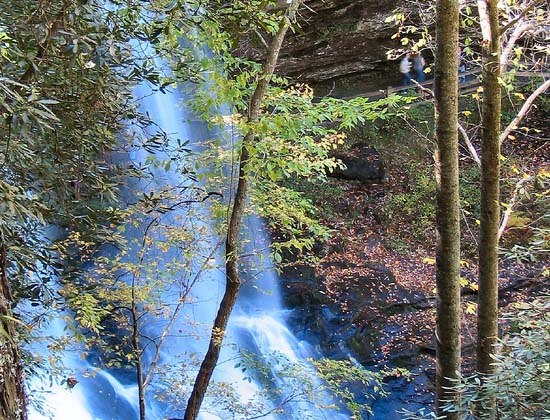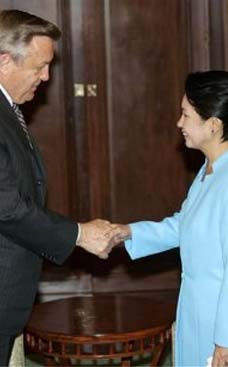
After a three-year stint in the late-‘70s working as an agricultural economist in the Peace Corps in Colombia, he read a book about conservation easements — property agreements that allow the landowner to keep land in the family while saving it from future development. He thought to himself, “You know? This makes a whole lot of sense.” As executive director of the Land Trust for the Little Tennessee, he oversees one of the most active land trusts in the region. What began in the mid-‘90s as a watershed association later fueled local efforts to protect not only the Upper Little Tennessee River in Macon County but other precious mountain communities in Jackson, Macon, Swain, Cherokee, Clay and Graham counties.
As executive director of the Land Trust for the Little Tennessee, Colombia RPCV Paul Carlson oversees one of the most active land trusts in the North Carolina
One acre at a time
Paul Carlson helps set the standard among WNC land trusts
By Michael Beadle
Caption: A scene from Nantahala National Forest Photo: QuiteLucid Flickr Creative Commons Attribution-NonCommercial-ShareAlike 2.0
Paul Carlson has plenty of maps to show you.
There are maps with stars. Color-coded maps of riverfront properties. Aerial photography maps. Maps of the past and maps of the future.
One particular map Carlson likes to use is a bumpy topography map of Western North Carolina. His hands gently gesture over the ancient folds and creases of the Nantahala, Cowee and Balsam mountains; the ribbons of rivers running through these ranges; and the rich valleys that are home to some of the most diverse range of species on the planet.
This corner of the world rose up more than 260 million years ago and survived eons of change to become a modern-day biologist’s Noah’s Ark with more than 3,000 species of plants and a habitat that welcomes a myriad of birds, trees and aquatic species. It’s a place where prickly pear cactus grows along with tropical ferns and spruce trees. For centuries it served as a path of migration for plants, animals and humans.
It’s the kind of place you’d want to preserve for future generations. So Carlson has made it his life mission to do just that.
As executive director of the Land Trust for the Little Tennessee, he oversees one of the most active land trusts in the region. What began in the mid-‘90s as a watershed association later fueled local efforts to protect not only the Upper Little Tennessee River in Macon County but other precious mountain communities in Jackson, Macon, Swain, Cherokee, Clay and Graham counties.
What took the Earth millions of years to create has the potential to be altered by humans in a matter of weeks and months. Paul Carlson and his staff at LTLT work to make sure there will be still some unspoiled lands that will endure. Think of it as saving these mountains, one acre at a time.
“If there’s any place we can make a stand,” Carlson says, “it is here.”
And in the coming years, he adds, the decisions of about 50 families in any given county of Western North Carolina may well tell the future story of what the region looks like in the centuries to come.
Using property agreements with local landowners, businesses and government agencies, the LTLT tries to ensure that today’s land will be protected from future housing and business developments that can be seen gouging out chunks of mountainsides, clear-cutting through scenic vistas, and deforesting watersheds until streams and rivers choke with dirt and trash. In what he calls a “dysfunctional landscape,” mowed lawns butt up against “wilderness,” making these areas ripe for the spread of exotic garden plants that can overwhelm delicate ecosystems. As once great stands of hemlocks have fallen victim to the woolly adelgid, could other tree species suffer a similar fate?
With all the news of global warming, air pollution, and unchecked development, it’s easy to get pessimistic, says Carlson. In today’s global economy, ecosystems are at risk all over the world. In Western North Carolina, commercial sprawl, the spread of non-native invasive plant species, air pollution and loss of farmland are rapidly altering the mountain landscape.
“We’re not doing enough fast enough,” Carlson says.
Nevertheless, LTLT has been recognized by scientists, community activists, county officials and forestry and wildlife agencies for helping to ease that footprint man continues to make on his surrounding environment.
When it comes to praising the LTLT, experts use words like “ambitious” and “sensitivity” to describe the attention to detail and the long-term planning that guides the organization.
“The Land Trust for the Little Tennessee has provided more than just another plan based on good intentions and good science; it has merged science with good sense,” explained Tom Hatley, professor of Cherokee Studies at Western Carolina University.
If the LTLT has earned such respect from academics, farmers and businesses, much of that success can be attributed to a visionary like Paul Carlson.
While Carlson gladly deflects kudos and heaps it on his hard-working staff and board, many will readily say the man at the helm of LTLT is just the right person for the job.
“He’s the driving force behind the land trust,” said Susan Ervin, a former LTLT board member and current volunteer with the trust. She and her husband Bill McLarney first met Carlson while working in Costa Rica about 25 years ago. They were interested in finding some land in Western North Carolina at the time and eventually all settled down in Macon County. Carlson, who speaks fluent Spanish, and Bill and Susan have remained close friends over the years as travelers and conservationists.
“He has a genuine love for the land,” Ervin said of Carlson. “He understands attachment to the land.” And more than that, he’s able to see that in other people.
“He’s not just some abstract specialist,” Ervin said.
He takes that love of land, that love of history and culture and puts it into a long-term perspective.
“He manages to keep it non-political,” Ervin added. “He’s very tactful.”
If Carlson has gained respect from county leaders from a wide political spectrum perhaps it is because he’s been able to impart that universal need to protect land and natural resources.
David Monteith, Swain County Commissioner who has worked some with Carlson, realizes that the two may not agree on every issue, but they both share that common goal of preserving the mountains.
“I believe in using our land wisely,” Monteith said.
And that common ground — quite literally — is what helps LTLT to continue forming relationships with local people who care the most about their land and its future.
“It’s not going to be yuppies from Gwinnett County,” Carlson quips.
Since its inception in 1999, the nonprofit community-based organization has helped secure easements along one third of the free-flowing section of the Little Tennessee River.
Perhaps its crowning achievement has been to preserve the 4,500-acre Needmore Tract, which protects 26 miles of riverfront property along the Little Tennessee River. Over the last few years alone, the size of LTLT’s easements have more than doubled in number to more than 50 miles along streams and reservoirs in Western North Carolina. And thanks to a partnership with Western Carolina University’s Natural Resources Management Program, LTLT has helped to create sustainable forest plans for more than 8,000 acres.
LTLT not only helps to preserve the sites it is entrusted with; it also works to restore the land using sustainable forestry practices, weeding out invasive plants like multi-flora rose and the Oriental bittersweet vine, and replanting trees along river banks to prevent erosion.
About 400 individuals and families and another 15 businesses are members of the LTLT. The organization receives foundation grants, government funding and private donations to set its annual half-million-dollar operations and programs budget.
Rural Values
Paul Carlson believes that all of his life work has prepared him for his current role as director of the Land Trust for the Little Tennessee.
Ever since he was six years old, he knew he wanted to work in the woods.
“I come from rural values,” he said.
Growing up on a hog farm in northwestern Illinois as the third youngest of four children, Carlson was raised with a love for the land. His childhood dream of becoming a forest ranger turned to an economics degree at the University of Illinois. He could use his analytical talents to help save Andean forests in South America.
After a three-year stint in the late-‘70s working as an agricultural economist in the Peace Corps in Colombia, he read a book about conservation easements — property agreements that allow the landowner to keep land in the family while saving it from future development. He thought to himself, “You know? This makes a whole lot of sense.”
Armed with a master’s degree in forestry, he returned to South America to work for the U.S. Agency for International Development as a highlands forestry advisor in Peru and then as an agroforestry advisor in Ecuador.
But save-the-world idealism isn’t always welcomed with open arms.
Back then Carlson happened to be in Peru during the heyday of the Shining Path, a Communist guerrilla group known for terrorist attacks and anti-U.S. sentiments. Carlson remembers that while living in Lima, Peru’s capital, windows in his apartment rumbled from a nearby car bomb. Years before in Colombia, he was robbed three times.
“We weren’t the most popular people in Peru,” Carlson said.
It didn’t help that he was a tall, white, Scandinavian Midwesterner who stood out like a sore thumb in the marketplaces where shorter, dark-skinned indigenous Peruvians shopped. But forestry was work he enjoyed doing — preserving lands while at the same time harvesting trees.
Peru is where he met his wife, Elena. Their daughter Sara, now a freshman at UNC-Chapel Hill, was born in Ecuador.
After 12 years in the Andean region, Carlson decided to move the family to Western North Carolina. In 1984, he bought some property in Macon County, but with his trips down to Ecuador, he didn’t settle down permanently until 1990. Soon after, he got involved in local land issues and was elected to the Soil and Water Conservation Board (his first and only elected office). Then, in 1994, he helped found the Little Tennessee Watershed Association. By the mid-‘90s, he was continuing to do freelance forestry work with the U.S. Forest Service and private landowners.
In 1996, he and a group of concerned citizens helped found the Nikwasi Land Trust under the umbrella of a larger land trust organization known as the Southern Appalachian Highlands Conservancy. Nikwasi is the name of the Cherokee settlement that stood for centuries before Franklin’s inception.
A year later thanks to a sizeable donation, Carlson became full-time director for the land trust, which changed its name to the Land Trust for the Little Tennessee in 1999. A few staff members expanded to several, and the LTLT eventually moved into second-story offices in downtown Franklin just above the Scottish Tartan Museum.
Its land easements expanded from Macon County to Jackson and Swain counties and beyond. The LTLT may have to change its name again, as its namesake now helps oversee conservation easements along the Tuckasegee, Hiwassee and Cheoah rivers.
LTLT’s Future
In addition to managing and restoring more land and conservation easements in Western North Carolina, LTLT is in the process of reorganizing itself to cover its mission of preserving the Little Tennessee, Hiwassee, Cheoah and Tuckasegee river valleys.
On a larger front, LTLT joined forces with other North Carolina land trusts, citizens and state officials for the Land for Tomorrow initiative that would dedicate an additional $1 billion in state funding over five years to protect land, waterways and critical habitats and heritage sites across North Carolina. It was set to be in last fall’s election, but Gov. Mike Easley wanted to study the plan further, so a 16-member panel that includes Western North Carolina’s Sen. John Snow, D-Murphy, and Rep. Phil Haire, D-Sylva, has been gathering comments and ideas on the issue.
“Both our legislators are key players in this initiative,” Carlson said.
Whether Land for Tomorrow passes or another funding initiative like it comes to fruition, Carlson predicts it will only be a matter of time before it becomes a reality. He adds that farmers will need to be key players if a land trust program is to succeed statewide.
“We desperately need money for farmland,” Carlson said, bemoaning the rapid disappearance of family farms.
One of the issues facing Land for Tomorrow is how it will be paid for, so the state commission is looking at a variety of ideas — everything from tourism taxes to water use fees to real estate and additional building permit fees.
On a national level, the work of land trusts is coming under more scrutiny as well. The number one charitable donation in 2006, according to the Internal Revenue Service, was the value of conservation easements. So, Carlson explains, the IRS is paying stricter attention to those aiming to save dollars as they save land. Unfortunately, like any program, there is room for abuse, and land conservation is no different, Carlson will admit. A landowner may decide this year to keep his property from being developed, but what will keep that land from being plowed over a generation later?
That’s where LTLT comes in. Keeping a close watch on these land easements, LTLT not only keeps the land safe from harm now. It will work with future landowners of that same tract to see that it doesn’t get subdivided and approved for a row of mobile homes stacked along a floodplain.
Eventually, by the year 2010, Carlson says there will be national accreditation standards for land trusts to adhere to so that land is truly protected as it says in the contract — “in perpetuity,” i.e. forever.
“Being a land trust, the bar is being raised all the time,” Carlson says.
But just when you think he’s swimming in reports about this many acres and the tedious details that surround a land acquisitions — easements, surveys and environmental studies — Carlson is quick to remember the focus of LTLT still needs to be about people and establishing trusting relationships with community members from all walks of life.
“Our work is all about people,” he says.



















